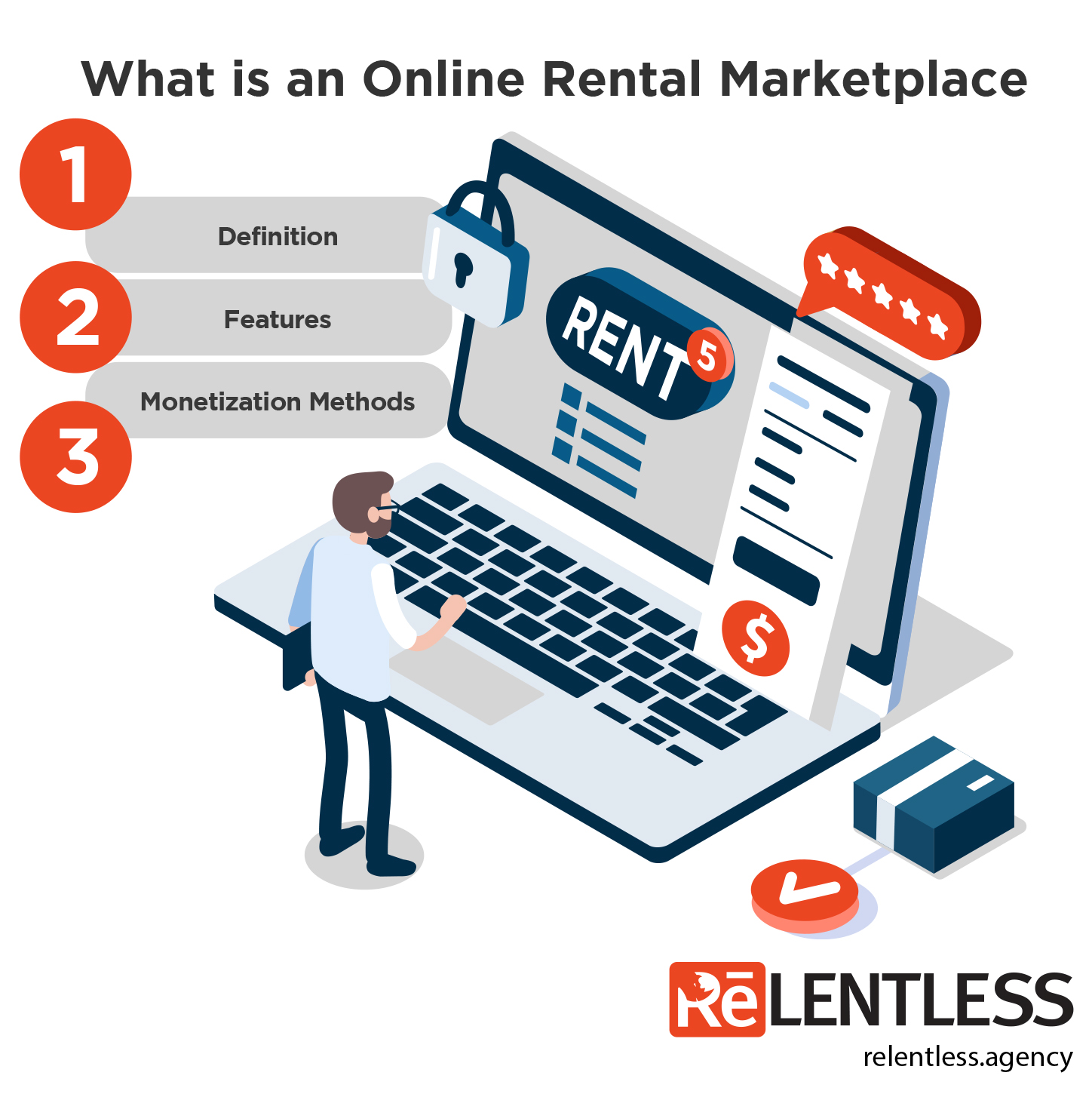Although some people might be unaware, every adult visits the marketplace daily or weekly. A marketplace is an arena for competitive or commercial dealings, and now because of technology, one does not need to travel to a location to do business. Whether you want to buy food, grocery, appliances, toys, or even rent something, you can do it in the comfort of your home just by visiting an online marketplace.
At first, the online marketplace business model was made for retail sales, but it has gradually expanded to various niches, including the rental industry. A recent study in the U.S. found that over 70% of people prefer renting rather than buying because it is a great way to save money without compromising quality. As a result, niche-based online rental marketplaces for vehicles, heavy equipment, audio-visual equipment, travel gear, appliances, etc., have been setting up shop. As such, peer-to-peer renting via online platforms has become popular.

Definition of Online Rental Marketplace
An online rental marketplace is a website or app that empowers the rental economy by providing a safe place to do business. It’s a rental eCommerce platform where two individuals can interact and settle their rental transactions. On one end, an online rental marketplace allows consumers to use products without buying them; on the other, it helps people make money from their underused products. At the center of these transactions are the website owners who act as mediators between the two individuals or entities at the dead center of these transactions.

Features
The features of an online rental marketplace drive the users to appreciate your website or app. Whichever niche you choose or whatever value proposition you want to add to your rental service, you should always start with the basic features of a rental marketplace. Below are some examples of what the users would expect from your services.

Account & Profile
Consumers and rental entrepreneurs must register using an email, mobile phone, or social media account. They can build a profile and leave information about themselves which depends on what the website owner would allow. Typically, a profile includes the user’s name, photo, and location.
Product Listing
The primary foundation of any rental website or application is its product listing. Filling out the product listing and viewing the product list should be a seamless process. If the owners find it difficult to add information or renters don’t get enough product details, it will eventually be harder to drive traffic due to poor customer experience.
Search
A search box should be visible on the homepage with enough filters to browse the rental products quickly. The list of filters would mainly depend on the website’s niche. The usual filters include product category, location, availability, etc.
Recommendations
Depending on what the users are searching for, it would increase user experience if the rental platform automatically gave them hints about the items to check out next. It will also help rental entrepreneurs gain more attention from potential clients and increase the time spent searching the website.
Booking & Product Availability
One great feature of an online rental marketplace is its ability to provide a seamless booking experience for both owners and renters. This interface typically involves a calendar where they can reserve a product for a set duration. Once successfully reserved or paid, it will show other potential renters the product availability, which helps avoid frustration and inconvenience.
Messaging
It is essential to discuss the rental product before closing the deal. The best way to manage this is to have a messaging interface within the platform. The users would greatly appreciate the ability to add photos and files to a message.
Notifications
There are times when users cannot check your website for updates. As a mediator, you should notify your users if they have a message, payment for approval, rental due date, etc. Depending on the platform, developers can set this up through in-app or email notifications.
Payments
The ability to make payments on the platform should be conveniently available. Additionally, as the owner of an online rental marketplace, this is where you can set up a commission-based monetization model.
Rating & Reviews
Rating and reviews should be available on the site for people to transact in good faith.
Usually, after a deal is closed, two sides should leave their comments about the experience. This feature saves the users from fearing low-quality products or untrustworthy renters.
Rental Dashboard & Account Management
The rental dashboard acts as a control panel for rental entrepreneurs; this area is where they can add products and modify their account details. It should also include their total profit, listings, ratings, reviews, etc. An analytical overview of the progress as a rental entrepreneur would make managing their business more accessible.
An online rental marketplace also needs platform managers to ensure the functions run smoothly. These managers would have admin privileges connected to listing approvals, blocking users, support, and overseeing the day-to-day activities of the website.
Monetization Methods
Online rental marketplaces do not have physical products to offer; instead, they provide seamless experiences to their users. There are four usual monetization method types: commission, payments for posting products, ad spaces, and premium listings.
Commission
The most widely used and well-known monetization model, wherein the rental marketplace would impute a specific percentage on top of the rental fee. The payment for renting an asset from an online rental marketplace would consist of two components, the rent plus commissions.
Payment for Posting Products
In this method, product owners pay for a specific product listing. Another popular technique would be subscription-based programs, where there would be a monthly fee before products are listed. Typically, website owners would need a significant amount of traffic before applying this method.

Premium Listing
For businesses with advertising budgets, a fee for placing their products at the top of the search results can be an option. If the website traffic is high, there is a potential for rental entrepreneurs to yield more profit with this technique.
Ad Spaces
Suppose you have a website with a good reputation and is highly visited by consumers. In that case, you can include advertising blocks on the website’s interface and sell them to businesses promoting their rental offerings. Collaborating with companies linked with your primary offering is also a splendid idea.
